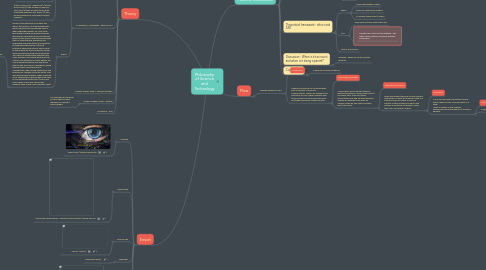
1. Theory
1.1. Rawls - Justice as Fairness
1.1.1. Justice and fairness are co-dependent
1.1.1.1. The greatest equal liberty principle - defined by the patterns of rights and duties, powers, and liabilities established by a practice
1.1.1.2. Inequalites are arbitrary unless it is reasonable to expect that they will work out for everyone's advantage
1.2. Slides - Ethics as a justification system
1.2.1. God, Intuition and Logic
1.2.2. Three approaches to ethics
1.2.2.1. Virtue Ethics
1.2.2.2. Ethics of duty
1.2.2.3. Utilitarianism
1.3. K. Waelbers, P. Dorstewitz - Ethics in ANT
1.3.1. Latour
1.3.1.1. Four forms of mediations
1.3.1.1.1. Translation
1.3.1.1.2. Composition
1.3.1.1.3. Delegation
1.3.1.1.4. Blackboxing
1.3.1.2. "But, in contrast to Latour, Darwin was deeply worried by the idea that his theory might result in a loss of ethic"
1.3.1.3. (Latour 2005, p. 52): ‘‘agents are (1) part of an account; (2) they are given a figure of some sort; (3) they are opposed to other competing agencies; and, finally, (4) they are accompanied by some explicit theory of action.’’
1.3.2. Ethics
1.3.2.1. People a have the ability to imagine and reflect their options, to make assessments and to adjust actions accordingly: that is what makes them agents for most moral philosophers. People are purposive beings with desires, ideas and beliefs, and they set goals for their actions. Ethical theories argue that for understanding, evaluating and responding to human action, it is important to understand the reasons or (moral) intentions behind the actions. Ethics seeks to define what we should regard as morally good and why we should pursue the good. The notion of intentionality addresses the ‘‘why’’ question. Even when we give up the notion of full autonomy in moral agency, we cannot dispense with the idea that moral agents need some form of awareness, which enables them to act purposefully. Consequently, when acting intentionally and purposefully, humans cannot be set on a par with technological artifacts. When analyzing socio-technological developments, we need to incorporate this distinction (Collins and Kusch 1998; Collins and Yearley 1992; Pickering 1995; Smith 2003; Swierstra 1995).
1.3.2.1.1. Er det mon en værdig kilde?
1.4. Gordon Graham Chap 1- Theories of ethics
1.5. Gordon Graham Chap 3 - Egoism
1.5.1. You lead the best life when you get what you want, regardless of how this affects others
1.6. Liv Egholm - ANT
2. Empiri
2.1. Arkangel
2.1.1. Black Mirror | Netflix Official Site
2.2. Familty time
2.2.1. FamilyTime App Features - Parental Control App for Android and iOS
2.3. Find my App
2.3.1. iCloud - Find My
2.4. Snapchat?
2.4.1. Snapchat Support
2.5. mSpy
2.5.1. mSpy™ Telefon overvågning applikation for forældrekontrol
2.6. Life 360
2.6.1. Life360 - International
3. Parental surveillance
3.1. Research question
3.1.1. I want to investigate the concept of parental surveillance in order to find out if there are different types of parental surveillance through apps in order to help my reader judge whether parental surveillance is ethical.
3.2. Introduction - set the scene - Arkangel
3.2.1. Parents has obligations
3.2.2. Arkangel takes parental surveillance to the extreme
3.3. Technologies for parental surveillance
3.3.1. Find my app - GPS surveillance
3.3.2. Family Time
3.4. Theoretical framework - ethics and ANT
3.4.1. Ethics
3.4.1.1. Three approaches to ethics
3.4.1.2. Ethics as justification systems
3.4.1.3. To modern approaches to ethics
3.4.2. ANT
3.4.2.1. What kind of human work does it do?
3.4.2.2. Children are a result of their network - but what if this network is limited by parental surveillance
3.4.3. Justice and fairness
3.5. Discussion - When is it too much and when is it being a parent?
3.5.1. Arkangel - where are we as a society heading?
3.6. Conclusion -
3.6.1. Is parental surveillance ethical?
4. Flow
4.1. Arkangel sparked an idea
4.1.1. Introduction
4.1.2. Parental surveillance for me have always been a question of trust and communication. Maybe I am biased in this discussion as I am a child of parents who never did this to me but expected me to write them everytime i moved location.
4.1.2.1. Technologies overview
4.1.2.2. I have choose to include two types of parental surveillance, find my phone (GPS) and family time. How does these technologies work and are there different degrees or methods to surveille our children. When do they know and when don't they know?
4.1.2.2.1. Theoretical framework
4.1.2.2.2. When discussing Ethics we can use different approaches, as there are different views as a parent but also as a child. A child is a product of their network but what if this network is limited by our parents. Using ethics as a justification system.
